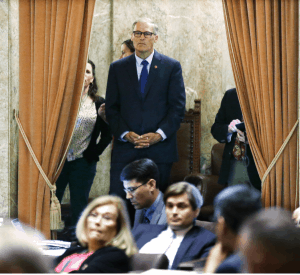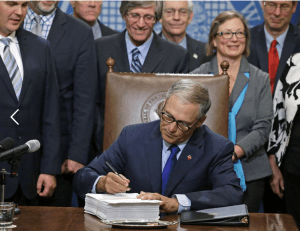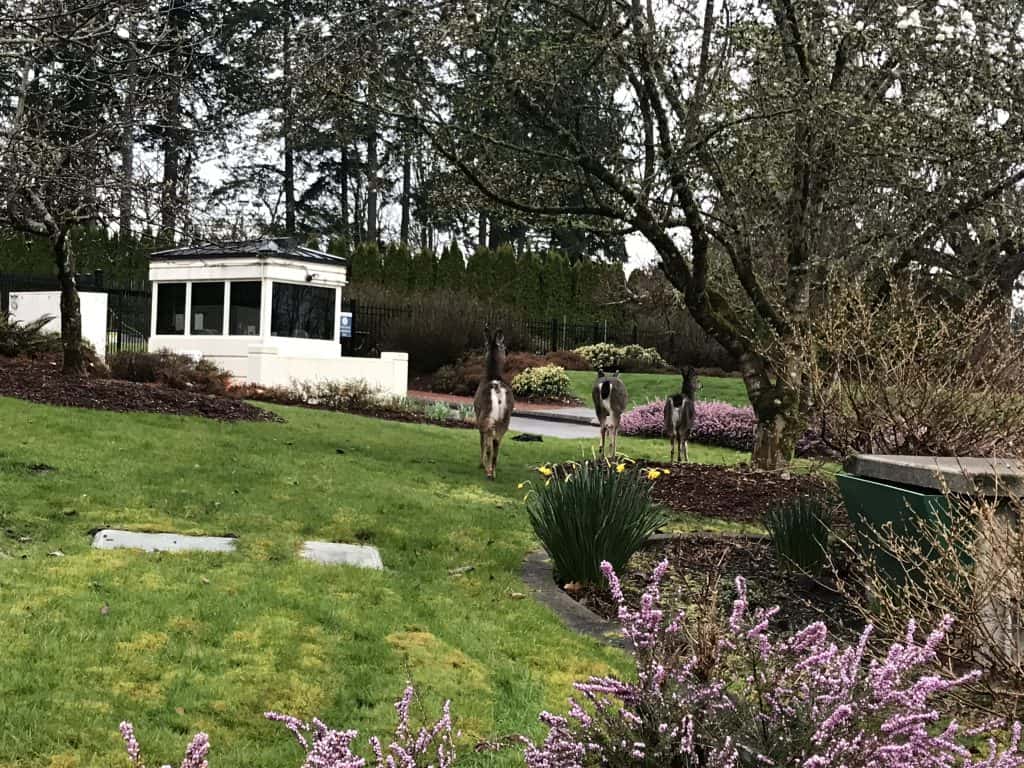
Notes From Olympia: March 26, Week 11 of the 2021 Legislative Session
In this Week’s Notes from Olympia: Budgets, American Rescue Plan Act (ARPA), and Trivia
Late last week, the security gates around the Capitol Campus were relaxed, allowing visitors – human and animal! – to enjoy the spring flowers.
Trivia!
Why was Governor Inslee in his Capitol office just before midnight on June 30, 2017?
Weekly Highlights
Senate and House Release Budget Proposals. On Thursday, the Senate released their Operating and Capital budget proposals. On Wednesday, the House released its Capital budget and will release their Operating budget on Friday afternoon (today).
The Senate budget clearly prioritizes early learning, with significant federal and state funding proposed to support implementation of the Fair Start for Kids Act. The Senate budget contains $509 million in federal funding for child care grants and provider reimbursement along with $312 million in the 2021-23 biennium for Fair Start for Kids investments.
Specific funded early learning policies in the Senate budgets include:
- Increasing Working Connections Child Care income eligibility to 60% of State Median Income
- Reform of the Working Connections Child Care co-payment structure to minimize the so-called “co-pay cliff”
- Increasing the reimbursement rate for Working Connections Child Care to 85th percentile of market rate
- Increasing the reimbursement rate for ECEAP by 10% starting in the 2021-23 school year
- Increasing ECEAP slots by 500 in state fiscal year 2022 and by 400 slots in state fiscal year 2023
- Funding to expand home visiting services and provide supports to enhance data collection and support the work of local implementation agencies
- Finally, providing funding for the complex needs funds and support for Infant Early Childhood Mental Health consultation.
With both the Senate and House proposed Capital budgets, they have also signaled the priority of investing capital dollars into growing the Early Learning Facilities funds and supporting capital early learning projects via local school districts.
What are the next steps? In the next few days, the Senate and House fiscal committees will hold public hearings to get feedback about what was and was not included in the budgets. The fiscal committees, followed by the full bodies, will approve the proposals, likely with some amendments. Once this happens, the public side of the work will be paused while Senate and House budget writers work behind the scenes to negotiate the differences between the two approaches.
Start Early WA is busy analyzing the details of the complicated and complex budget proposal (and the soon to be released House Operating budget proposal) and will post more detailed summaries on the policy resources part of our website next week.
Fair Start for Kids Act Bills Both Continue to Advance. On Wednesday, the House Children, Youth and Families Committee passed E2SSB 5237 and the Senate Early Learning and K-12 Committee passed E2SHB 1213. While both bills are technically still alive, we do expect only one bill to be heard in a fiscal committee. As of this writing, it is unclear which bill will serve as the vehicle.
Prior to advancing the bills, both committees adopted “striking” amendments (striking amendments remove the original bill language and substitute with new language). After adoption of these striking amendments, the two bills are closely aligned on most policy issues. The release of the Senate and House budget proposals will give us a good idea of how each body is prioritizing funding the policies in the bills. By the end of the legislative session, we should see a policy bill with corresponding budget investments to support implementation of the final bill’s policies.
Given the interplay with the budget, the question of which bill will be the ultimate vehicle going forward and the likelihood of further amendments in an upcoming fiscal committee hearing, Start Early WA will not be updating the bill resource documents on our website to reflect the striking amendments adopted on Wednesday. Instead, we will include a fuller analysis in the April 2nd Notes from Olympia comparing the budget proposals and bill details.
Fiscal Committee Hearing on American Rescue Plan Act (ARPA). On March 19th, the Senate Ways and Means Committee had a briefing from the Governor’s Office of Financial Management and the Governor’s Washington D.C. staff on key components of the American Rescue Plan Act (ARPA). The staff shared key highlights, emphasizing there are still a number of questions on use of funds and noted that, in some cases, state allocations for certain purposes are still being developed.
In addition to funding for specific purposes, Washington state is slated to receive $4.25 billion in “flexible funds” and local governments will receive an additional $2.6 billion. Other key investments include an estimated $404 million for emergency rental assistance as well as additional funding for broadband, behavioral health, WIC and the Supplemental Nutritional Assistance Program (SNAP).
ARPA includes $390.6 million in child care stabilization grants. Of this amount, 90% must be sub-granted to providers by a deadline of September 30, 2021. Up to 10% of this amount can be directed to DCYF for administrative expenses, including technical assistance and public awareness. In addition, ARPA includes a one-time $244 million increase to the Child Care and Development Block Grant which must be spent within three years.
Policy Committee Cutoff/Fiscal Cutoff Coming. A quick reminder that today is the deadline for bills out of the policy committee of the opposite house. A week from today is the deadline for bills to pass out of the fiscal committee of the opposite house. This means the next seven days will be focused on the Senate Ways and Means and House Appropriations Committees. Just like with the English language, there are always exceptions to this rule.
Early Childhood Connector Grant Opportunity. Early Childhood Connector, an online community that supports early childhood systems building, has issued a Call for Interest from community systems builders who are interested in receiving grant funds to pilot new features and capabilities of the platform to help achieve more equitable outcomes for young children, from before birth to age eight, their families, and the early childhood workforce in their community.
Start Early Washington is Hiring. Start Early Washington an energized, future-focused organization committed to providing quality early learning and care across Washington. We are recruiting individuals who want to join us in this mission and share a commitment to our core values of appreciation & respect, empowerment, diversity, excellence, learning and communication. We are hiring for a Senior Communications and Policy Manager and a ParentChild+ Program Manager. Please help us spread the word!
Trivia Answers
The Washington state fiscal year ends each June 30th. If July 1st hits and the state does not have an enacted budget in place, a chain of events that no one wants to see is set off. Under ideal circumstances, the Legislature will pass a budget prior to adjourning sine die in April (odd-numbered years) or March (even-numbered years). This timing gives the Governor and their staff ample time to review the budget components, prepare any necessary vetoes and sign the budget well in advance of the start of the next fiscal year.
During the intense years in the mid 2010’s when the state was working to meet its judicial mandate to fully fund basic education (the so called “McCleary decision”), the Legislature went a few years where they did not adopt a budget prior to the scheduled adjournment date, necessitating that the Governor call one (or more) special sessions to resolve issues and ultimately pass a budget.
Back to our trivia question. The 2017 budget deliberations went down to the wire with both the Senate and the House of Representatives passing the budget on June 30th. As you can see from the pictures below, the Governor was on hand at the Capitol that night and signed the budget just prior to midnight, July 1st. Crisis averted!
Since 2017, all of the budgets have passed well-before the end of the fiscal year. The jury is out if that on-time trend will continue in 2021, but I am hopeful.

Governor Inslee in the House wings observing House budget deliberations on June 30th

Success! Governor Inslee signing the 2017-2019 biennial budget just before the stroke of midnight July 1, 2017 (See – same suit and tie as in the picture above)
Photos Courtesy Spokesman Review Archives
About the Author

Erica Hallock
Director, Policy & Advocacy, Start Early Washington
Erica Hallock serves as the Director of Policy and Advocacy for Start Early Washington. She has worked in early childhood, health and human services policy in both California and Washington state.
More About Erica
